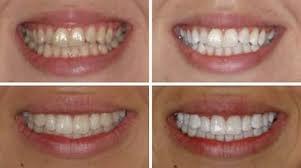Whitening
Dental bleaching, also known as tooth whitening, is a common procedure in general dentistry but most especially in the field of cosmetic dentistry. A child's decidous teeth are generally whiter than the adult teeth that follow. As a person ages the adult teeth often become darker due to changes in the mineral structure of the tooth, as the enamel becomes less porous. Teeth can also become stained by bacterial pigments, foodstuffs and tobacco. Certain antibiotic medications (like tetracycline)can also cause teeth stains or a reduction in the brilliance of the enamel.
In-office bleaching is the fastest and most effective way to whiten teeth. With this process, the whitening product is applied directly to the patient's teeth. This process may include the use of heat, a special light, and/or a laser. These tools help to accelerate the whitening process. In order to achieve dramatic results, several appointments will usually be needed. However, with laser-enhanced bleaching, dramatic results can be seen after the first treatment.Whitening is not permanent, and people who expose their teeth to smoking, and foods or beverages that cause staining may see the whiteness start to fade in as little as 1 month. People who stay away from these things may be able to last up to a year or even longer before another whitening treatment or touch-up is needed.
The degree of whiteness will vary from individual to individual. Depending upon the condition of the teeth, nature of the stain, and whether or not an individual is a smoker, can all be factors.
Call New England Dental, LLC at (203) 790 0111 to find out if the whitening process is right for you.

Power Whitening Procedure


